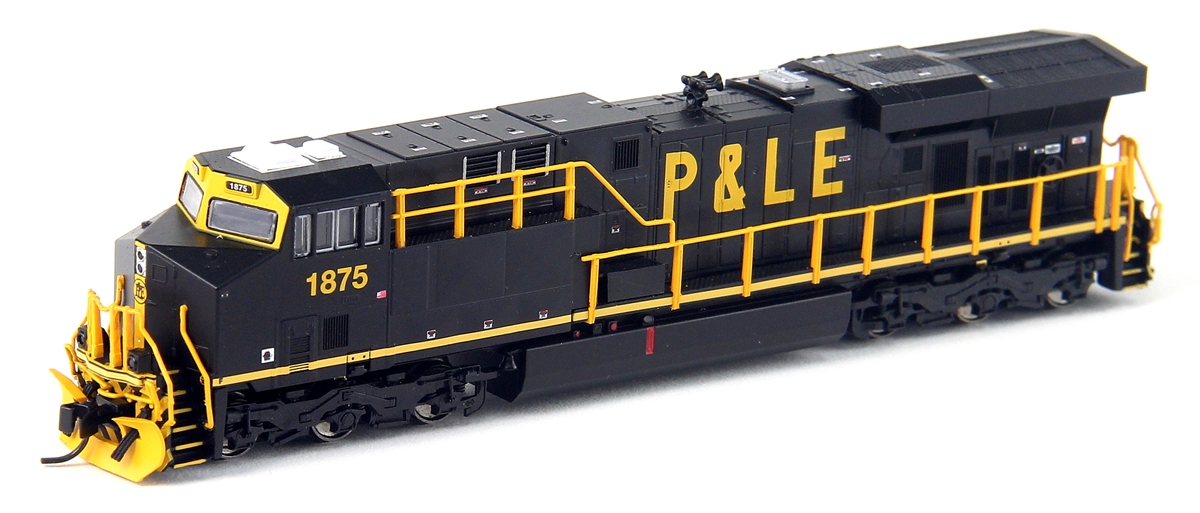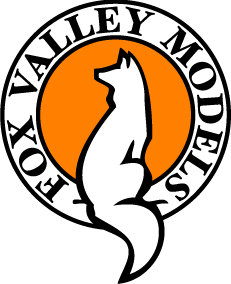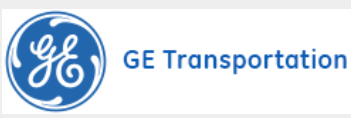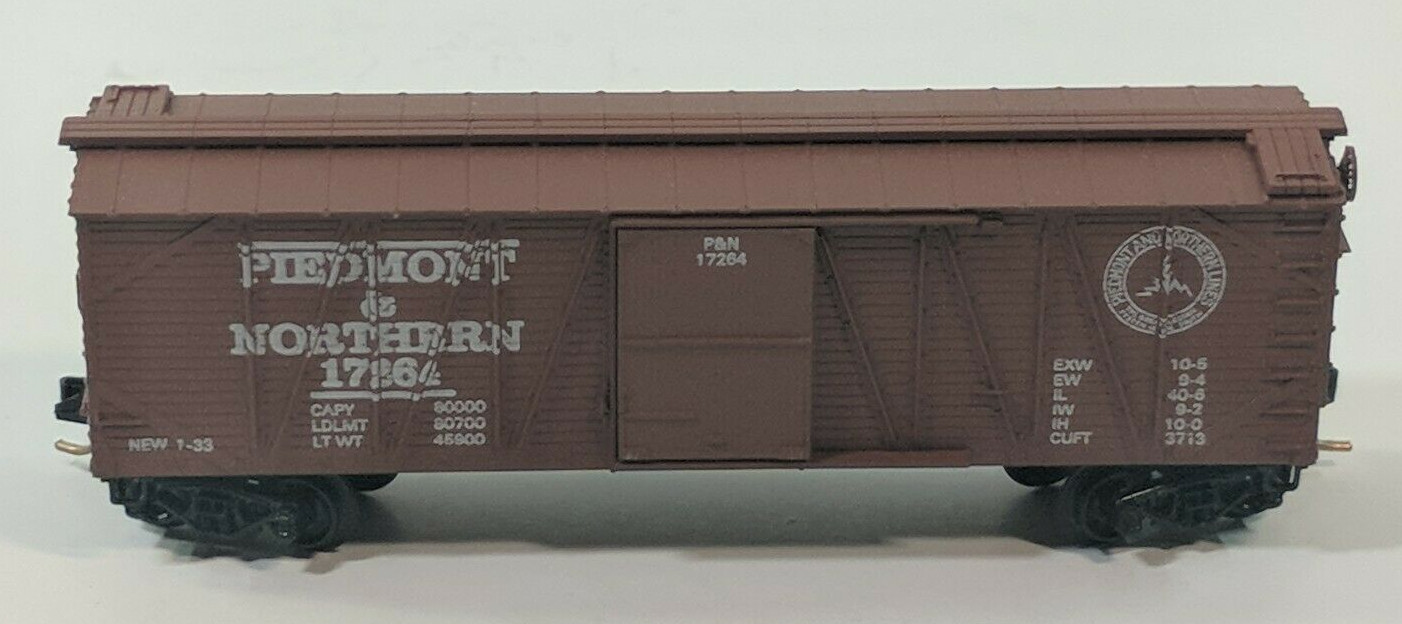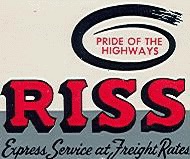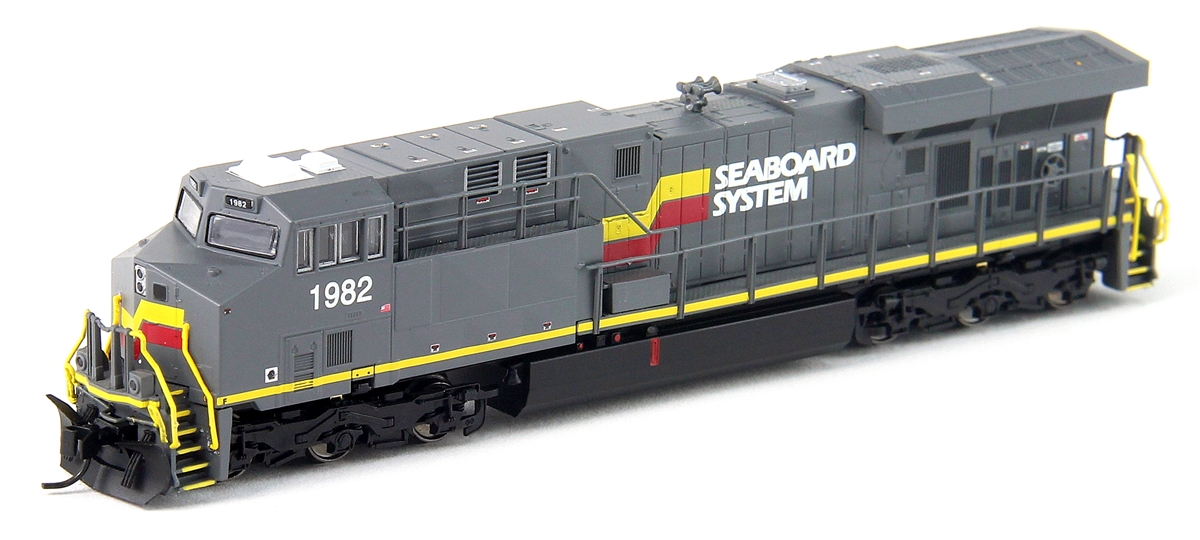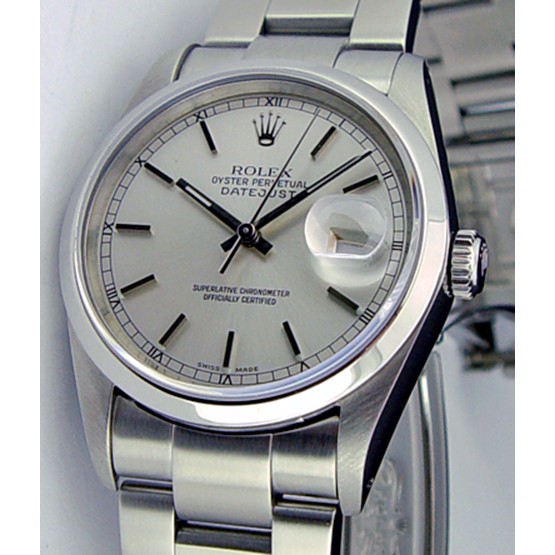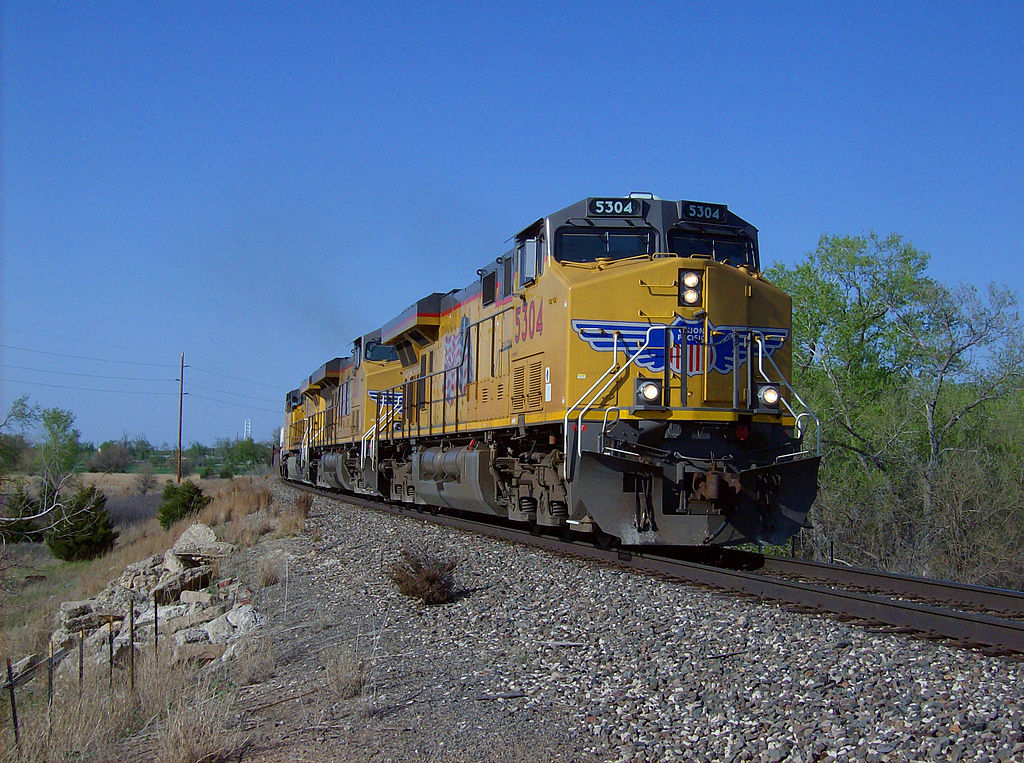Specific Item Information: Fantasy Heritage Scheme.
Model Information: This model was introduced in 2009 (ES44AC), 2010 (ES44DC) and 2013 (ES44C4). The Fox Valley ES44AC was their first N scale locomotive model. It is an amazing first effort. The paint and detailing are outstanding (exceeding even the likes of Atlas and Kato). They run quietly and can pull a lot of cars on a flat surface and handle well even on steep inclines.
This is a typical modern engine with a split frame, blackened metal wheels, dual flywheels, and LED lighting.
This ES44C4 is using FVM standard DC body; FVM tooled new trucks to represent the added levers and cylinders that raise and lower the middle axle on the real deal. This is done to adjust the amount of tractive effort applied to the rails on the 4 drive axles.
This is a typical modern engine with a split frame, blackened metal wheels, dual flywheels, and LED lighting.
This ES44C4 is using FVM standard DC body; FVM tooled new trucks to represent the added levers and cylinders that raise and lower the middle axle on the real deal. This is done to adjust the amount of tractive effort applied to the rails on the 4 drive axles.
DCC Information:
- Original Fox Valley Models Accepts NEM-651 plug-in decoder.
- Scale Trains produced DCC Ready Accepts Next-18 plug-in decoder.
Prototype History: The Evolution Series is a line of diesel locomotives built by GE Transportation Systems, initially designed to meet the U.S. EPA's Tier 2 locomotive emissions standards that took effect in 2005. The first pre-production units were built in 2003. Evolution Series locomotives are equipped with either AC or DC traction motors, depending on the customer's preference. All are powered by the GE GEVO engine.
The Evolution Series was named as one of the "10 Locomotives That Changed Railroading" by industry publication Trains Magazine. It was the only locomotive introduced after 1972 to be included in that list. The Evolution Series, mainly the ES44DC, ES44AC, and ET44AC, are some of the best-selling and most successful freight locomotives in United States history, far surpassing the output of Electro-Motive Diesel.
ES44AC
The ES44AC (Evolution Series, 4400 HP, AC traction) replaced the AC4400CW model in the General Electric catalogue. The GE Evolution Series ES44AC locomotive represents an incredible combination of power, performance and efficiency. Originally designed to meet US EPA Tier 2 emissions, the ES44AC locomotive utilizes a 12-cylinder GE Evolution Series engine with 4-stroke combustion technology to maintain horsepower, reduce emissions, and lower fuel consumption compared to GE’s predecessor 16-cylinder FDL engine. From 2005 to 2015, the ES44AC became GE’s standard North American locomotive and a compelling platform for others worldwide.
ES44AH (C45AH)
The "H" in ES44AH stands for "heavy", which is in reference to a combination of subsystems that produce high levels of tractive effort at low speeds. UP's "AH" types are similar to CSXT's, except for their Hi-Ad trucks, and are designated C45AH's by Union Pacific.
ES44C4
The ES44C4 (Evolution Series, 4400 HP, AC traction, 4 powered axles) was introduced in 2009. While similar to the ES44AC, the ES44C4 has two traction motors per truck, instead of the conventional three such as on the ES44AC. The center axle of each truck is unpowered, giving an A1A-A1A wheel arrangement. BNSF Railway is the launch customer for this model.
ES44DC
The ES44DC (Evolution Series, 4400 HP, DC traction) replaced the Dash 9-44CW model in the General Electric catalogue. Primary users are BNSF Railway, CSX Transportation, and Canadian National Railway.
ET44AC
The ET44AC (Evolution Series Tier 4, 4400 HP, AC traction) replaces the ES44AC model. The GE Evolution Series ET44AC locomotive meets the U.S. Environmental Protection Agency’s (EPA) stringent Tier 4 emission standards without the use of any aftertreatment, enabling railroads to gain significant savings through urea infrastructure cost avoidance and reduced operational costs. Part of the Ecomagination-certified Evolution Series, the ET44AC locomotive is designed to meet Tier 4 emissions standards by reducing emissions by 70% below Tier 3 requirements. GE Transportation has invested $600M in the Evolution Series since its introduction in 2005 and is the first supplier of Tier 4 locomotives for Class 1 railroads.
ET44AH (C45AH)
Successor of the ES44AH.
ET44C4
Successor of the ES44C4.
From Wikipedia
From GE transportation website
Read more on American-Rails.com
The Evolution Series was named as one of the "10 Locomotives That Changed Railroading" by industry publication Trains Magazine. It was the only locomotive introduced after 1972 to be included in that list. The Evolution Series, mainly the ES44DC, ES44AC, and ET44AC, are some of the best-selling and most successful freight locomotives in United States history, far surpassing the output of Electro-Motive Diesel.
ES44AC
The ES44AC (Evolution Series, 4400 HP, AC traction) replaced the AC4400CW model in the General Electric catalogue. The GE Evolution Series ES44AC locomotive represents an incredible combination of power, performance and efficiency. Originally designed to meet US EPA Tier 2 emissions, the ES44AC locomotive utilizes a 12-cylinder GE Evolution Series engine with 4-stroke combustion technology to maintain horsepower, reduce emissions, and lower fuel consumption compared to GE’s predecessor 16-cylinder FDL engine. From 2005 to 2015, the ES44AC became GE’s standard North American locomotive and a compelling platform for others worldwide.
ES44AH (C45AH)
The "H" in ES44AH stands for "heavy", which is in reference to a combination of subsystems that produce high levels of tractive effort at low speeds. UP's "AH" types are similar to CSXT's, except for their Hi-Ad trucks, and are designated C45AH's by Union Pacific.
ES44C4
The ES44C4 (Evolution Series, 4400 HP, AC traction, 4 powered axles) was introduced in 2009. While similar to the ES44AC, the ES44C4 has two traction motors per truck, instead of the conventional three such as on the ES44AC. The center axle of each truck is unpowered, giving an A1A-A1A wheel arrangement. BNSF Railway is the launch customer for this model.
ES44DC
The ES44DC (Evolution Series, 4400 HP, DC traction) replaced the Dash 9-44CW model in the General Electric catalogue. Primary users are BNSF Railway, CSX Transportation, and Canadian National Railway.
ET44AC
The ET44AC (Evolution Series Tier 4, 4400 HP, AC traction) replaces the ES44AC model. The GE Evolution Series ET44AC locomotive meets the U.S. Environmental Protection Agency’s (EPA) stringent Tier 4 emission standards without the use of any aftertreatment, enabling railroads to gain significant savings through urea infrastructure cost avoidance and reduced operational costs. Part of the Ecomagination-certified Evolution Series, the ET44AC locomotive is designed to meet Tier 4 emissions standards by reducing emissions by 70% below Tier 3 requirements. GE Transportation has invested $600M in the Evolution Series since its introduction in 2005 and is the first supplier of Tier 4 locomotives for Class 1 railroads.
ET44AH (C45AH)
Successor of the ES44AH.
ET44C4
Successor of the ES44C4.
From Wikipedia
From GE transportation website
Read more on American-Rails.com
Road Name History: 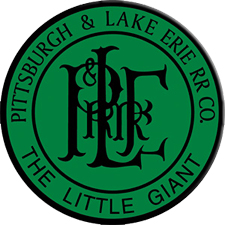 The Pittsburgh and Lake Erie Railroad (P&LE) (reporting mark PLE), also known as the "Little Giant", was formed on May 11, 1875. In 1880, William Henry Vanderbilt's Lake Shore and Michigan Southern Railway bought stock to the tune of $200,000 in the P&LE. The P&LE would stay in the Vanderbilt's New York Central system until Conrail. Company headquarters were located in Pittsburgh, Pennsylvania. The line connected Pittsburgh in the east with Youngstown, Ohio at nearby Haselton, Ohio in the west and Connellsville, Pennsylvania to the east. It did not reach Lake Erie (at Ashtabula, Ohio) until the formation of Conrail in 1976.
The Pittsburgh and Lake Erie Railroad (P&LE) (reporting mark PLE), also known as the "Little Giant", was formed on May 11, 1875. In 1880, William Henry Vanderbilt's Lake Shore and Michigan Southern Railway bought stock to the tune of $200,000 in the P&LE. The P&LE would stay in the Vanderbilt's New York Central system until Conrail. Company headquarters were located in Pittsburgh, Pennsylvania. The line connected Pittsburgh in the east with Youngstown, Ohio at nearby Haselton, Ohio in the west and Connellsville, Pennsylvania to the east. It did not reach Lake Erie (at Ashtabula, Ohio) until the formation of Conrail in 1976.
The P&LE was known as the "Little Giant" since the tonnage that it moved was out of proportion to its route mileage. While it operated around one tenth of one percent of the nation's railroad miles, it hauled around one percent of its tonnage. This was largely because the P&LE served the steel mills of the greater Pittsburgh area, which consumed and shipped vast amounts of material. It was a specialized railroad deriving much of its revenue from coal, coke, iron ore, limestone, and steel. The eventual closure of the steel mills led to the end of the P&LE as an independent line in 1992.
At the end of 1970 P&LE operated 211 miles of road on 784 miles of track, not including PC&Y and Y&S; in 1970 it reported 1419 million ton-miles of revenue freight, down from 2437 million in 1944.

The P&LE was known as the "Little Giant" since the tonnage that it moved was out of proportion to its route mileage. While it operated around one tenth of one percent of the nation's railroad miles, it hauled around one percent of its tonnage. This was largely because the P&LE served the steel mills of the greater Pittsburgh area, which consumed and shipped vast amounts of material. It was a specialized railroad deriving much of its revenue from coal, coke, iron ore, limestone, and steel. The eventual closure of the steel mills led to the end of the P&LE as an independent line in 1992.
At the end of 1970 P&LE operated 211 miles of road on 784 miles of track, not including PC&Y and Y&S; in 1970 it reported 1419 million ton-miles of revenue freight, down from 2437 million in 1944.
Brand/Importer Information: Fox Valley Models is a small supplier of
model railroad and related products. FVM
started by finding solutions to different
challenges that model railroaders were
faced with. Our first products resulted
from a need to equip custom built
passenger cars with tinted windows made
of an ideal material; thin, flexible, easy to
cut, simple to install, available in multiple
colors and be affordable. We met those
needs and even included a frosted
version for the car's lavatory windows.
Other challenges inspired additional products including wooden grade crossings, trestles and different lineside structures. As our product line expands, input and requests from friends and customers help shape the product selection further.
Future products, under development, include more parts, structures, details and rolling stock. We strive to offer a good quality product at an affordable price.
Other challenges inspired additional products including wooden grade crossings, trestles and different lineside structures. As our product line expands, input and requests from friends and customers help shape the product selection further.
Future products, under development, include more parts, structures, details and rolling stock. We strive to offer a good quality product at an affordable price.
Item created by: gdm on 2017-09-15 17:32:22
If you see errors or missing data in this entry, please feel free to log in and edit it. Anyone with a Gmail account can log in instantly.
If you see errors or missing data in this entry, please feel free to log in and edit it. Anyone with a Gmail account can log in instantly.


